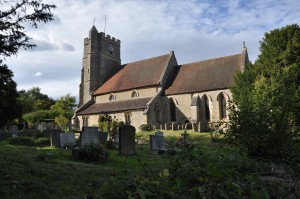It takes a day or two to settle in.
Saturday afternoon, jet-lagged and disoriented, we set out in search of food. A map kindly provided by our host located essential resources in the area and Sainsbury’s seemed like the best choice for basic shopping. We fed the store’s coordinates into Nuvi, our GPS, and followed instructions back into the dreaded Headington roundabout and quickly out. Suddenly Sainsbury’s appeared on the left, even though Nuvi wanted us to go farther. We generally follow orders; this time we broke rank and turned left into the parking lot.
We found chicken and pork, olive oil and red wine vinegar, vegetables, eggs, butter, bread and milk. (Failing to make a list led to a second visit two days later.) Dinner was simple but good: boiled little potatoes; chicken breast seared then poached in a mix of olive oil, white wine and grainy mustard; watercress, baby spinach, and rocket (a bag from the salad section) tossed with vinaigrette.
It was enough to keep us going for a bit longer. At nine we gave up and went to bed.
Sunlight filled the tiny window and I slipped from under the duvet and into the shower. At nine the carillon of St. John the Baptist let me know it was time to dry my hair and go to church. I haven’t been to church, just to go to church, in a while. This tiny structure, begun in the 13th-century and completed in the 15th, reminded me of the church in Preston village in Hertfordshire. Every so often it was my turn, as a Princess Helena College student taking piano lessons, to play the organ, prelude, hymns and postlude.
I was a terrible organist. But then I was a terrible pianist, too.
It was a congregation of eight, a small group. All of us listened attentively to readings from Amos, Paul’s epistle to Timothy and the Gospel of Luke, readings focused on the theme of forgiveness. The priest, a youngish woman, offered a cogent and engaging meditation on the passage from Luke, the parable of the untrustworthy steward who, when about to lose his job because of his dishonesty, manages to regain it by forgiving debts owed by various individuals to the master. Clever man. The debtors were happy because they owed less; the master was happy because his reputation and social standing were enhanced; and this led to happiness for the steward because he stayed employed.
The point was that forgiveness, even when extended for the most dubious of motives, is a good thing. Forgiveness, one might say, is the positive aspect of the law of unintended consequences.
When I returned from church, my Dear One, having reaped the benefits of an extra hour or two of rest, was ready for an explore. We explored all the way to Bath, detouring down Burford’s charming and parking-space-less High Street, and then finding our way into Bibury via Ditch Road, four miles of Cotswolds perfection. Ditch Road is straight from central casting, each house more charming than the one before, each garden more colorful, each bend around stone wall or shaded stream producing another gasp of delight.
A light rain dampened Bath and the late hour kept us from the Roman baths and an exploration of the Abbey. This is a town of hanging flower pots. They were everywhere, masses of yellow and orange, pinks, blues, and diaphanous whites. Does a truck with a very long hose come by and water them daily? What happens when the petunias get leggy and the impatiens need deadheading? Does someone climb up and prune away or is the raggedy pot simply replaced with something newer?
A candy store open ten minutes past closing time allowed us to stock up on clotted cream fudge and toffee with hazlenuts. So, so good. The drive back seemed to take no time at all.


